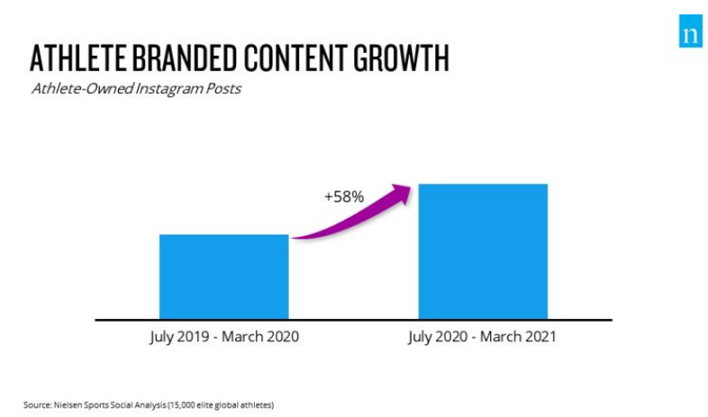
 The COVID-19 pandemic and limitations on fan attendance at live events has created a new sponsorship reality. Brands are adjusting how they activate their partnerships, and digital platforms have become the front runner in the market.
The COVID-19 pandemic and limitations on fan attendance at live events has created a new sponsorship reality. Brands are adjusting how they activate their partnerships, and digital platforms have become the front runner in the market.
Social media and other online platforms have become the primary vehicles to deliver a powerful virtual event experience and are unlocking new opportunities to connect with fans from afar.
As the digital dimension sweeps the sports sponsorship scene, athlete association and endorsement is becoming increasingly more prominent for brands trying to connect with new fans and the current trends are indicating that they are only going to become more valuable in the future. Nielsen analysis carried out on more than 15,000 athlete-owned Instagram accounts shows a spike in the number of branded content posts, recently growing 58%.
The power of athlete involvement on social media has come to the forefront in conveying causes and purposes. Our research has shown that athletes with over 5 million followers on Instagram generated $314 million of QI (Quality Index) media value through posts highlighting social causes in 2020, registering an 80% growth against 2019.
This increasing opportunity for brand partnerships on social platforms naturally follows consumer habits. According to Nielsen Fan Insights, the number of fans using social media for sports news or content rose 83% from September 2019 to January 2021. The acceleration toward digital platforms is striking when looking at the recent evolution of the social media profiles owned by International Federations that are joining or rejoining the Olympics Games in Tokyo this summer.

The official Instagram profiles of the International Federations of Skateboarding, Surfing, Climbing, Karate and Baseball/Softball have registered an average 133% growth in followers over the last two years, with the International Federation of Sport Climbing showing the highest engagement rate in 2021 of 3%. For comparison, the average engagement rate of International Federations of more traditional sports during the same time period was 1.4%.
A similar growth pattern can be seen for the social profiles of the International Football Associations with limited success to date. With the EURO fast approaching, Nielsen analysis has shown an average 145% growth in followers over the last two years for associations with no more than one appearance at the UEFA European Championship Finals. Notably, the Football Association of Finland registered the highest engagement rate in 2021 of 4.5%. For comparison, the average growth in that same time period was only 75% on average for the Football Associations of the historically successful nations including Italy, France, Portugal and England. The typical engagement rate with content over this time was 1%.
New brand partnerships are now reaping the rewards of the digital activation and athlete association. An example of this is the official launch video for TikTok’s UEFA EURO 2020 sponsorship. The 35-second football mashup clip features some of the greatest moments in tournament history and today’s biggest stars including Robert Lewandowski, Trent Alexander-Arnold, Memphis Depay and Antoine Griezmann. In February, it generated more than 6 million views and 160,000 interactions on TikTok profiles owned by UEFA and TikTok. Viewership of the video was 89% higher when compared to the average post on @tiktok_it and 145% higher than the average post on @uefa2020 during the month of February.
Aside from increasing engagement, digital activation allows brands to review near real-time metrics and adjust campaigns instantaneously to increase fan impact. It also enables brands to react fast and capitalize on the magic moments on the pitch, in the pool or on the track to fully leverage their associations with live events.
Understanding Key Performance Indicators before starting a campaign and having the ability to compare metrics across platforms and tie back to brand impact has never been more important. Consequently, Nielsen Sports has developed an all-in-one interactive dashboard to enable a granular understanding of the effects of digital campaigns by tracking performance, personalities, audience and how everything impacts perception and brand equity.
Source:Nielsen Sports